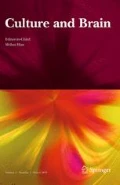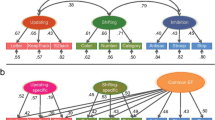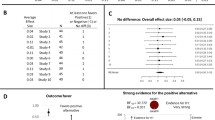Abstract
The beneficial effects of bilingualism on executive functions have been shown through studies that demonstrated the outperformance of bilingual individuals than monolingual individuals in cognitive tasks involving attention, working memory and conflict resolution. However, the neural mechanisms of how bilingualism influence these cognitive processes remains unclear. In addition, there is a considerable amount of diversities and inconsistencies in the link between bilingualism and executive control, which altogether require a thorough discussion. In this paper, we will provide a concise and informative mini-review of how one cultural experience—bilingualism influences executive control and explore the underlying brain mechanisms that reveal the relationship among bilingualism, executive control and neuroplasticity. Furthermore, how bilingualism could benefit other important aspects of regulatory processes through interacting executive control are also discussed.
Similar content being viewed by others
References
Alladi, S., Bak, T. H., Duggirala, V., Surampudi, B., Shailaja, M., Shukla, A. K., et al. (2013). Bilingualism delays age at onset of dementia, independent of education and immigration status. Neurology,. doi:10.1212/01.wnl.0000436620.33155.a4.
Bialystok, E., & Craik, F. M. (2010). Cognitive and linguisitc processing in the bilingual mind. Current Directions in Psychological Science, 19(1), 19–23.
Bialystok, E., Craik, F. M., & Luk, G. (2012). Bilingualism: consequences for mind and brain. Trends in Cognitive Sciences, 16(4), 240–250.
Chee, M., Zheng, H., Goh, J., Park, D., & Sutton, B. P. (2011). Brain structure in young and old East Asians and Westerners: comparisons of structural volume and cortical thickness. Journal of Cognitive Neuroscience, 23(5), 1065–1079.
Colzato, L., Van Den Wildenberg, W., Bajo, M. T., Paolieri, D., Nieuwenhuis, S., La Heij, W., & Hommel, B. (2008). How Does Bilingualism Improve Executive Control? A Comparison of Active and Reactive Inhibition Mechanisms. Journal of Experimental Psychology. Learning, Memory, and Cognition, 34(2), 302–312.
Costa, A., Hernandez, M., & Sebastian-Galles, N. (2008). Bilingualism aids conflict resolution: evidence from the ANT task. Cognition, 106(1), 59–86.
Goh, J. S., Hebrank, A. C., Sutton, B. P., Chee, M. L., Sim, S. Y., & Park, D. C. (2013). Culture-related differences in default network activity during visuo-spatial judgments. Social Cognitive and Affective Neuroscience, 8(2), 134–142.
Gold, B. T., Kim, C., Johnson, N. F., Kryscio, R. J., & Smith, C. D. (2013). Lifelong bilingualism maintains neural efficiency for cognitive control in aging. The Journal of Neuroscience, 33(2), 387–396.
Gyurak, A., Gross, J. J., & Etkin, A. (2011). Explicit and implicit emotion regulation: a dual-process framework. Cognition and Emotion, 25(3), 400–412.
Hernandez, A., Dapretto, M., Mazziotta, J., & Bookheimer, S. (2001). Language switching and language representation in Spanish–English bilinguals: an fMRI study. Neuroimage, 14(2), 510–520.
Hilchey, M., & Klein, R. (2011). Are there bilingual advantages on nonlinguistic interference tasks? Implications for the plasticity of executive control processes. Psychonomic Bulletin & Review, 18(4), 625–658.
Kohn, N., Eickhoff, S., Scheller, M., Laird, A., Fox, P., & Habel, U. (2013). Neural network of cognitive emotion regulation—an ALE meta-analysis and MACM analysis. Neuroimage,. doi:10.1016/j.neuroimage.2013.11.001.
Luk, G., Bialystok, E., Craik, F. M., & Grady, C. L. (2011). Lifelong bilingualism maintains white matter integrity in older adults. The Journal of Neuroscience, 31(46), 16808–16813.
Marian, V., & Shook, A. (2012). The cognitive benefits of being bilingual (p. 201213). Cerebrum: The Dana Forum on Brain Science.
Morales, J., Calvo, A., & Bialystok, E. (2013). Working memory development in monolingual and bilingual children. Journal of Experimental Child Psychology, 114(2), 187–202.
Nisbett, R., & Masuda, T. (2003). Culture and point of view. Proceedings of the National Academy of Sciences of the United States of America, 100(19), 11163–11170.
Nisbett, R., & Miyamoto, Y. (2005). The influence of culture: holistic versus analytic perception. Trends in Cognitive Sciences, 9(10), 467–473.
Ochsner, K. N., & Gross, J. J. (2005). The cognitive control of emotion. Trends in Cognitive Sciences, 9(5), 242–249.
Tang, Y. Y., Zhang, W., Chen, K., Feng, S., Ji, Y., Shen, J., et al. (2006). Arithmetic processing in the brain shaped by cultures. Proceedings of the National Academy of Sciences, USA, 103(28), 10775–10780.
Viviani, R. (2013). Emotion regulation, attention to emotion, and the ventral attentional network. Frontiers in Human Neuroscience, 7, 746.
Acknowledgments
This work was supported by the Office of Naval Research. We thank Michael Posner for his insightful comments.
Author information
Authors and Affiliations
Corresponding author
Rights and permissions
About this article
Cite this article
Tang, R., Tang, YY. Bilingualism, executive control and neuroplasticity. Cult. Brain 3, 68–74 (2015). https://doi.org/10.1007/s40167-015-0028-x
Accepted:
Published:
Issue Date:
DOI: https://doi.org/10.1007/s40167-015-0028-x




